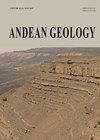玻利维亚内部岩浆弧Real Cordilera的地质年代
IF 1.2
4区 地球科学
Q3 GEOLOGY
引用次数: 1
摘要
真正的科迪勒拉花岗岩类是位于玻利维亚中部安第斯山脉东部科迪勒拉岩心的一套三叠纪和渐新世岩体。它的大地构造环境、化学和矿石组成使其成为所谓的“内岩浆弧”的一部分,与紧邻西部的实际“岩浆弧”不同。为了约束其结晶年龄,测定了U-Pb SHRIMP年龄。三叠纪花岗闪长岩为240±2 Ma,伊兰普花岗闪长岩为230.7±1.3 Ma,华那Potosí花岗闪长岩为222.2±2.4 Ma,塔克西花岗闪长岩为221.9±1.5 Ma。渐新世花岗岩年龄分别为26.87±0.26 Ma和26.88±0.21 Ma。Illampu和Taquesi花岗闪长岩的镁铁质包裹体的年龄分别为234.1±1.3 Ma和227±1.3 Ma,比它们各自的花岗类寄主更早。与区域热异常和岩浆熔体富集有关的二次过程重置了K/Ar和U/Pb同位素系统,产生了:a) Ar损失导致的年轻年龄和b) U/Pb同位素比例重组导致的更老年龄。正如之前的研究所指出的,Zongo/Kuticucho三叠纪花岗岩在大多数分析的锆石中具有极高的铀富集,产生了U/Pb比值的重置,年龄范围的跨度很大,反向的不均匀曲线模糊了其实际的结晶年龄。在这些“冷”且继承丰富的花岗岩中发现了相对丰富的锆石继承,年龄表明物源来自早古生代的变长岩,也有旧源的再循环。这种相对丰富的异晶继承记录了冈瓦尼德造山运动(336-205 Ma)作为一个整体的俯冲弧环境的影响,在其最后阶段被大陆裂陷(245-220 Ma)的印记所打断。本文章由计算机程序翻译,如有差异,请以英文原文为准。
Geochronology of the Real Cordillera, the inner magmatic arc of Bolivia
The Real Cordillera granitoids are a suite of Triassic and Oligocene plutons located at the core of the Eastern Cordillera of the Central Andes of Bolivia. Its geotectonical setting, chemical and ore composition make them part of the so called “Inner Magmatic Arc” which differs from the actual “Magmatic Arc” located immediately to the west. U-Pb SHRIMP ages were obtained in order to constrain their crystallization ages. The Triassic group yielded the following results: 240 ± 2 Ma for the Huato granite, 230.7 ± 1.3 Ma for the Illampu granodiorite, 222.2 ± 2.4 Ma for the Huayna Potosí granite and 221.9 ± 1.5 Ma for the Taquesi granodiorite. For the Oligocene group we obtained two ages of 26.87 ± 0.26 and 26.88 ± 0.21 Ma both for the Quimsa Cruz granite. Mafic enclaves from the Illampu and Taquesi granodiorites report ages that were older than their respective granitoid hosts, yielding 234.1 ± 1.3 Ma and 227 ± 1.3 Ma, respectively. Secondary processes related to regional thermal anomalies and magmatic melt-enrichment, reset the K/Ar and U/Pb isotopic systems, producing: a) younger ages by Ar loss and b) older ages by U/Pb isotopic ratios reorganization. As noted in previous studies, the Zongo/Kuticucho Triassic granite yielded extremely high U enrichment in most zircon analysed, producing reset of U/Pb ratios, wide span in age ranges and reverse discordia curves that obscure its actual crystallization age. Relatively abundant zircon inheritance was found in these “cold” and inheritance-rich granitoids, with ages suggesting provenance from early Paleozoic metapelites that also recycled older sources. This relatively abundant xenocrystic inheritance records the influence of the Gondwanide orogeny (336-205 Ma) as an overall subduction arc environment, punctuated at its final stage with the imprint of a continental rifting (245-220 Ma).
求助全文
通过发布文献求助,成功后即可免费获取论文全文。
去求助
来源期刊

Andean Geology
地学-地质学
CiteScore
3.90
自引率
0.00%
发文量
17
审稿时长
>12 weeks
期刊介绍:
This journal publishes original and review articles on geology and related sciences, in Spanish or English, in three issues a year (January, May and September). Articles or notes on major topics of broad interest in Earth Sciences dealing with the geology of South and Central America and Antarctica, and particularly of the Andes, are welcomed.
The journal is interested in publishing thematic sets of papers and accepts articles dealing with systematic Paleontology only if their main focus is the chronostratigraphical, paleoecological and/or paleogeographical importance of the taxa described therein.
 求助内容:
求助内容: 应助结果提醒方式:
应助结果提醒方式:


